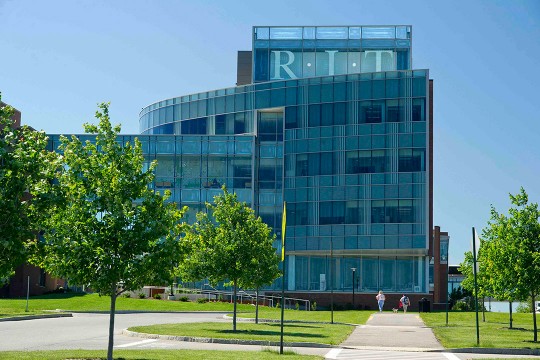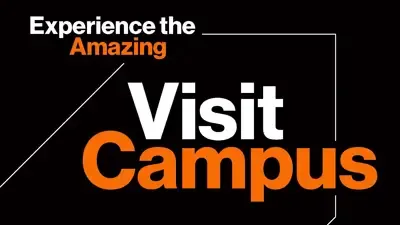Product Development Master of Science Degree

Product Development
Master of Science Degree
- RIT /
- Rochester Institute of Technology /
- Academics /
- Product Development MS
Overview for Product Development MS
Why Pursue a Master's in Product Development at RIT?
STEM-OPT Visa Eligible: The STEM Optional Practical Training (OPT) program allows full-time, on-campus international students on an F-1 student visa to stay and work in the U.S. for up to three years after graduation.
Future-Focused Curriculum: Provides a dynamic program designed by academic and industry leaders to integrate formal education with state-of-the-art research and best practices from industry.
Flexible Learning: Complete your product development master's entirely online or on-campus.
Employer Sponsorship: Benefit from financial support and a well-articulated career development plan working with your sponsoring employer.
RIT's product development degree is a leadership program for experienced engineers and technical specialists who aspire to high-level positions associated with product innovation. The product development program integrates business and engineering management courses, delivering them online or on-campus so you can continue to work while taking classes.
New products and services are the lifeblood of today’s high-technology firms, and companies need more technically grounded leaders to drive the engine for business growth. RIT's product development master's integrates business and engineering courses consistent with cross-functional, end-to-end product development and the systems perspective critical to conceive, create, launch, and support today’s complex product portfolios. You will acquire the foundation skills and strategic perspective necessary to become a future leader and senior manager who drives business growth through new products and services. In short, the master's in product development program prepares today’s technical experts for successful careers as project leaders and technically grounded senior managers of their enterprises.
To stay on the cutting edge, the product development program was designed by academic and industry leaders to integrate formal education with state-of-the-art research and best practices from industry. It includes a year-long capstone project that generates significant return on investment for sponsoring organizations. Electives and the capstone project provide flexibility to tailor the program's content to specific learning objectives of students and sponsoring organizations. The master's in product development is offered fully online or as a blend of online and on-campus courses. You may start any term (fall, spring, summer) and complete courses at your own pace.
Sponsorship
Most students are sponsored by an employer who is committed to improving leadership capabilities in product development. Sponsorship includes financial support and a commitment to work with you to provide clear expectations and a well-articulated career development plan that builds upon the product development program. Candidates are welcome to sponsor themselves. You may contact Financial Aid and Scholarship for more information.
-
Don't Delay Your Ambitions Until the Fall
This program offers a spring start, which means you can jumpstart your graduate journey and begin your studies this January.
-
Meet us on-campus on February 19
Learn about the programs that interest you. Hear from program faculty, speak with current graduate students, and ask the questions that will help you get one step closer to your career goals.
Featured Work and Profiles
-
Making a Global Impact in Product Development
Margot Sandy, an RIT alumna and self-employed product development consultant, travels the world working with inventors and entrepreneurs to bring their ideas to life.
Read More about Making a Global Impact in Product Development -
Bob Gerardi
Stout Risius Ross - Chief Marketing and Business Development Officer “My eyes have been opened to areas that our company can significantly improve, if we apply new ideas and are willing to change the way we do business. My participation in the MPD program has provided...
Read More about Bob Gerardi -
Neil Dempsey
Panasonic Solutions Division – Director of Engineering & QA “My MPD experience equipped me with necessary tools to handle broader aspects of product development, the importance of engineering and manufacturing to the health of the firm, and the challenges that...
Read More about Neil Dempsey -
Joseph Hancock
ARCA (Bollengo, Italy) – Chief Technology Officer “I don’t think a month has gone by since I graduated that I have not considered and leveraged the knowledge and experience that I gained in the MPD program.”
Read More about Joseph Hancock -
Scott Latona
Branson Ultrasonics - Vice President of Global Operations and Supply Chain “As Vice President of Global Operations, I continue to put my RIT MPD education to work. Being able to effectively communicate and interface with marketing, business development, product engineering...
Read More about Scott Latona -
Charles Gardiner
Xerox - Vice President of Distributed Development “I have seen several of the program participants we have sponsored ‘step-up’ to the next level. Some are now tackling the complexity of international product development partnerships and some are...
Read More about Charles Gardiner
Curriculum for 2025-2026 for Product Development MS
Current Students: See Curriculum Requirements
Note for online students
The frequency of required and elective course offerings in the online program will vary, semester by semester, and will not always match the information presented here. Online students are advised to seek guidance from the listed program contact when developing their individual program course schedule.
Students are also interested in
Admissions and Financial Aid
This program is available on-campus or online.
On Campus
| Offered | Admit Term(s) | Application Deadline | STEM Designated |
|---|---|---|---|
| Full-time | Fall or Spring | Rolling | Yes |
| Part-time | Fall or Spring | Rolling | No |
Online
| Offered | Admit Term(s) | Application Deadline | STEM Designated |
|---|---|---|---|
| Full-time | Fall or Spring | Rolling | No |
| Part-time | Fall or Spring | Rolling | No |
Full-time study is 9+ semester credit hours. Part-time study is 1‑8 semester credit hours. International students requiring a visa to study at the RIT Rochester campus must study full‑time.
Application Details
To be considered for admission to the Product Development MS program, candidates must fulfill the following requirements:
- Complete an online graduate application.
- Submit copies of official transcript(s) (in English) of all previously completed undergraduate and graduate course work, including any transfer credit earned.
- Hold a baccalaureate degree (or US equivalent) from an accredited university or college in engineering (or a related scientific or technical field). A minimum cumulative GPA of 3.0 (or equivalent) is recommended.
- Satisfy prerequisite requirements and/or complete bridge courses prior to starting program coursework.
- Submit a current resume or curriculum vitae.
- Submit a personal statement of educational objectives.
- Submit one letter of recommendation.
- Entrance exam requirements: None
- Submit English language test scores (TOEFL, IELTS, PTE Academic, etc.), if required. Details are below.
English Language Test Scores
International applicants whose native language is not English must submit one of the following official English language test scores. Some international applicants may be considered for an English test requirement waiver.
Duolingo (DET): 120
IELTS: 6.5
LanguageCert Academic: 70
PTE Academic: 56
TOEFL: 79
International students below the minimum requirement may be considered for conditional admission. Deaf and hard-of-hearing test takers with significant hearing loss do not need to take the listening and speaking sections for the TOEFL and IELTS. Each program requires balanced sub-scores when determining an applicant’s need for additional English language courses.
How to Apply Start or Manage Your Application
Cost and Financial Aid
An RIT graduate degree is an investment with lifelong returns. Graduate tuition varies by degree, the number of credits taken per semester, and delivery method. View the general cost of attendance or estimate the cost of your graduate degree.
A combination of sources can help fund your graduate degree. Learn how to fund your degree
Additional Information
Prerequisites
Have at least two years of experience in product development or a related business environment.
Online Degree Information
The Product Development MS program is designed to be completed part-time (1 or 2 courses per term). Full-time options may be available with Graduate Program Director's approval. Your time to completion will depend on your plan of study, when your courses are offered, what electives you select, and if you choose to/are able to take a class for the summer term. Courses may be synchronous or asynchronous based on the preference of the course instructor. Academic advisors work with students on a study plan after admission to ensure classes fit student availability. Typically students finish this degree in 24-36 months. For specific details about the delivery format and learning experience, contact the Program Contact listed on this page. RIT does not offer student visas for online study.
Online Tuition Eligibility
The online Product Development MS is considered a professional degree that is billed at the standard (on campus) RIT graduate tuition rate. It is not billed at the designated online tuition rate. Scholarship is available off the standard tuition rate for this online program. View the current Graduate tuition rate.
Online Study Restrictions for Some International Students
Certain countries are subject to comprehensive embargoes under US Export Controls, which prohibit virtually ALL exports, imports, and other transactions without a license or other US Government authorization. Learners from the Crimea region of the Ukraine, Cuba, Iran, North Korea, and Syria may not register for RIT online courses. Nor may individuals on the United States Treasury Department’s list of Specially Designated Nationals or the United States Commerce Department’s table of Deny Orders. By registering for RIT online courses, you represent and warrant that you are not located in, under the control of, or a national or resident of any such country or on any such list.
Accreditation
Related News
-
November 28, 2022

Alumna uses film to teach community building
Tina Cannaday Chapman DaCosta ’04 MS, ’14 MFA is using her parents’ life stories to teach important lessons about diversity, equity, and inclusion. In fall 2022, the director of RIT’s Brick by Brick Theater program released Dear Eleanor, her second short film based on her parents’ lives.
-
October 8, 2019

Packing for a trip? Big Flats native saves space with her powdered hair products
The Elmira Star-Gazette features Kailey Bradt ’15 (chemical engineering), ’18 MS (product development), founder of OWA (Out of this World Amazing) Haircare.
-
September 26, 2019

RIT hosts two new webinars about engineering leadership programs
Professionals interested in advancing leadership skills in high-tech industries can learn about different degree options through an informational webinar hosted by Kate Gleason College of Engineering on Oct. 17 and Nov. 14.
Contact
- Lindsay Lewis
- Senior Assistant Director
- Office of Graduate Admissions
- Enrollment Management
- 585‑475‑5532
- lslges@rit.edu
- Katie McConky
- Department Head
- Department of Industrial and Systems Engineering
- Kate Gleason College of Engineering
- 585‑475‑6062
- katie.mcconky@rit.edu
Department of Engineering Leadership






















